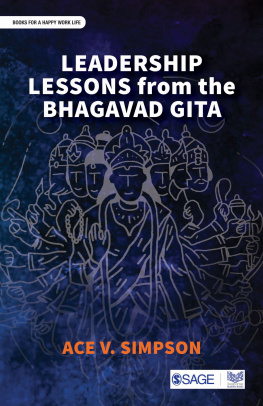SAGE was founded in 1965 by Sara Miller McCune to support the dissemination of usable knowledge by publishing innovative and high-quality research and teaching content. Today, we publish over 900 journals, including those of more than 400 learned societies, more than 800 new books per year, and a growing range of library products including archives, data, case studies, reports, and video. SAGE remains majority-owned by our founder, and after Saras lifetime will become owned by a charitable trust that secures our continued independence.
Los Angeles | London | New Delhi | Singapore | Washington DC | Melbourne
A dvance P raise
With the modern day technologies and education, many have access to vast and varied content on leadership to learn from and build their skills. As a lifelong student of technology and leadership, I see a very unique way in which Dr Simpson has translated the timeless teachings of the Bhagavad Gita into the linked-leadership model connecting four core and essential elementshigher purpose, self-awareness, servant leadership and holistic systems. These are in turn linked to the foundational teachings of the 700 verses forming the fabric that connects everything together in a logical manner. The work offers leaders invaluable perspectives on human psychology, motivation, strategy, culture, sustainability and a service orientation that are derived from the works deep spiritual foundation. Even those who are unconvinced by the works philosophical rather than empirical basis will at the very least have a basis for reflecting on how leadership might be done differentlywith greater humility, respect and compassion. I highly recommend this book to build, enrich and refine ones leadership skills to achieve the best performance from themselves and their organizations.
Upendra M. Kulkarni
Vice President, Firmware and Software Engineering,
Intel Corporation
Those of us familiar with Indias ancient book of wisdom, the Bhagavad Gita, tend to roll our eyes when we see yet another translation of it published or yet another commentary, especially one about the Gita on Leadership. But with Leadership Lessons from the Bhagavad Gita , I am not just happily surprised, but frankly amazed to see how deftly Ace Simpson has brought forth the Gitas wisdom to illuminate the very depths of what it means to be and to act as a leader in all spheres of ones life, bringing real benefit for both the leader and those who would follow. The translation of the original text is both faithful to the text and finely done, the reflections are richly illuminating for deep understanding of what is true leadership, and insights are backed up with references for empirical support. If todays leaders-to-be read this book and imbibe its teachings, there is great hope for our world.
Kenneth Valpey
Oxford Centre for Hindu Studies, Oxford, UK
Dr Simpsons mastery in the field of leadership through his PhD and academic career, and his deep understanding of the great spiritual text the Bhagavad Gita, which has been his guiding light since childhood, render him uniquely qualified to make this marvellous contribution: Leadership Lessons from the Bhagavad Gita. He provides apt translations of all verses from the Bhagavad Gita, which he elegantly arranges in a thematic fashion and shares his sagacious reflections, which are deeply profound. The significant leadership lessons that Dr Simpson draws should be relevant across a wide spectrum of situationspersonal, interpersonal and organizational. A must read for all leaders in todays turbulent environmentbe that turbulence internal or external.
Ravi Kathuria
Professor, and James and Lynne Doti Chair
in Operations Management,
The George L. Argyros School of Business and Economics, Chapman University, Orange, CA, USA
The Bhagavad Gita, which is a small part of the Mahabharata, is predominately considered to be a spiritual, religious and philosophical text for many followers of Sanatana Dharma. But an in-depth research of the Bhagavad Gita reveals that its message is universal and also applicable in organizational management and leadership. The great effort made by Dr Ace Simpson in presenting Leadership Lessons from the Bhagavad Gita will not only be useful for Indian business leaders, but will provide the psychological and philosophical insights for Western business leaders too.
Balakrishnan Muniapan
Associate Professor in Human Resource Management,
Wawasan Open University, Malaysia
Dr Ace Simpsons well-structured thesis on sustainable, empowered leadership from the perspective of the Bhagavad Gita achieves the impressive task of combining the Gitas penetrating life wisdom with an experienced voice on organizational behaviour. The result is a timeless and yet timely blueprint for evolved human conduct. Simpsons translation of the Gita is complemented by a collection of reflections that balance deep philosophical insights with a pragmatic and achievable model for a new era of higher-minded leadership. At once spiritual and academic, and personal and directive, this book is an essential reading for those who wish to understand and deepen their own potential while positively impacting the lives of the people they teach, care for and lead.
Simon Haas
Teacher of yoga philosophy;
Author of The Book of Dharma and
Yoga and the Dark Night of the Soul
Good leadership is essential in all aspects of life. Drawing from the ancient wisdom of Indias pre-eminent scriptural text, the 5,000-year-old Bhagavad Gita, Ace Simpson shares with us knowledge that can inspire todays leaders to fulfil their responsibilities in working with those under their command. Along with practical advice that made successful leaders through the ages, Leadership Lessons from the Bhagavad Gita stresses leadership combined with empathy and compassion. After all, a leaders greatest asset is the men and women under his or her command. This is not just another modern-day book on leadership. It is unique in that it draws from the sagacity of the divine.
Indradyumna Swami
Monk, author and spiritual teacher
Leadership requires a clear moral compass and a compelling vision which others can follow. This dazzling book might offer a way to remedy the sad lack of both today. It lucidly spells out practical lessons for todays leaders by mining the profound wisdom of the Baghavad Gita in a new way. The linked-leadership model prescribes ways to build effective relationships by wise leaders who have learned a level of self-awareness in order to succeed. If anyone is equipped to bridge the worlds of how yoga scripture can build modern management success with surprising insights, Dr Simpson is the man.
Mark OBrien
Founder of Qi Health & Yoga and yoga teacher,
Sydney, Australia
Approaches to organizational sustainability are often biased towards the environmental component, while the human social one is neglected. What we need is a balanced perspective that puts both human beings and (the other elements of) nature at the core of organizational (and societal) sustainability. Leadership Lessons from the Bhagavad Gita is a highly valuable contribution to understand how virtuous leaders may be crucial agents in pursuing such an endeavour. Ace Simpson helps us to understand how leaders may manage themselves and others in the pursuit of a more meaningful life. He shows how the 700-verse Sanskrit scripture represents a noble repository of wisdom for leaders who aim to discover paths to be wiser, more humble, better human beings and virtuous builders of organizational and societal sustainability.
Armnio Rego
Professor, Catlica Porto Business School, Porto, Portugal














